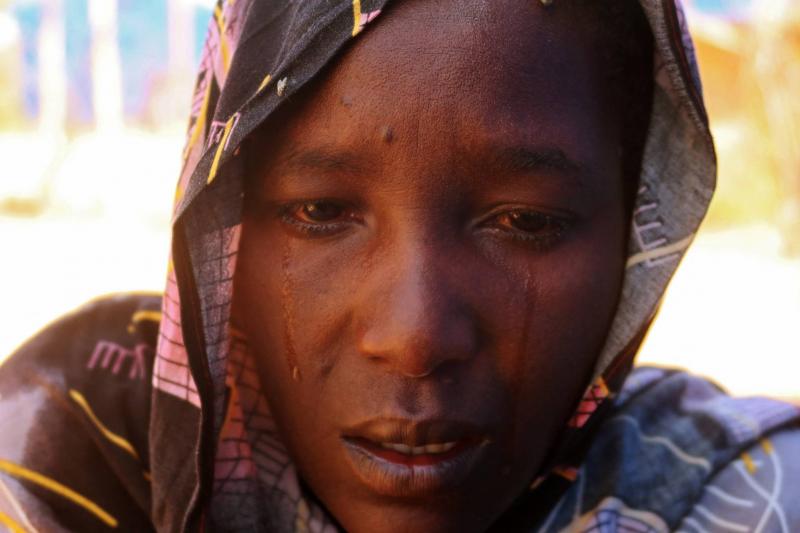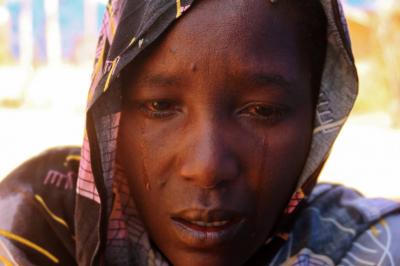On that day, members of an Arab militia searched for children and found a small boy named Ibrahim Saleh, who was two years old. Little Ibrahim, his baby sister, and their mother, Safaa Abdul Kareem, were fleeing in June from a massacre that spanned weeks in the Sudanese city of Geneina, where Arab militia members shot, stabbed, and burned to death the dark-skinned members of their tribe, the Massalit. Safaa’s husband was among those killed. She and her two children, along with dozens of women and children, sought to reach a safe haven in neighboring Chad. This nearly became a reality. However, about ten kilometers from the border, they were stopped by forces of the Arab militia and armed men who ordered her to hand over Ibrahim. She recounted how they searched his clothing to determine his gender, then forced him to sit and began to beat his head and body with wooden sticks. "He was crying and screaming... Mama... Mama," she said, and when she tried to save him, one of the men shot her below the shoulder, leaving a scar. She added, "I kept screaming... leave my son... don't kill my son." The men continued to beat Ibrahim until he fell lifeless. Safaa is one of more than 40 mothers who recounted to Reuters how their sons, mostly boys, were killed by Rapid Support Forces and allied Arab militias during an ethnic cleansing campaign this year that occurred in and around Geneina, the capital of West Darfur state.
Her son and other children all belonged to the Massalit tribe, which used to be the majority in Geneina until the RSF and Arab militias forced them out. About half a million people, mostly Massalit, fled to Chad due to the violence. Thousands have been killed in the attacks, including women and girls. Women from the Massalit reported being sexually assaulted by RSF forces, which are predominantly Arab, as detailed by Reuters last month. However, witnesses say that during this wave of killings, the Arab forces specifically targeted males, from infants to adults.
Children were shot to death. Thirty-six mothers told Reuters that their children were shot at close range, including 33 boys and eight girls. Six mothers stated they witnessed their children, some as young as six months old, being beaten to death by armed RSF members and Arab militia. Five out of the six children killed in this manner were boys. The killers also used knives, and ten individuals who fled to Chad reported seeing children being slaughtered, all of whom were boys. These children were killed as they fled with their mothers from Geneina. On the way to Chad, five survivors described how militia men stopped women carrying their children, checked the child's gender, and killed them if they were found to be boys.
The RSF and allied militias also pursued the men of the Massalit tribe. In the latest wave of violence in Geneina in November, Reuters revealed that hundreds of young men from the tribe were rounded up and taken to various locations in the city, where witnesses reported that some were executed. More than 30 women interviewed by Reuters for this report said their husbands, brothers, or fathers were killed or went missing in attacks this year. Several women indicated they hid their brothers or smuggled them out of Geneina for fear of being targeted. Dozens of men recounted how they had to traverse vast valleys and navigate remote roads to Chad to evade checkpoints set up by the RSF and Arab militia.
Reuters could not independently verify the details of some accounts. In some instances, friends and neighbors confirmed parts of stories recounted by survivors. Common patterns in violence were reflected in the testimonies of survivors. For some, Reuters was able to review registration cards issued to refugees by the United Nations.
The UN has so far gathered demographic data on more than a quarter of the 484,000 refugees who fled Sudan this year and are currently living in camps along the border. Based on that data, the UN estimates that the number of adult women crossing the border is nearly double that of men. Although males were specifically targeted, the gap among children is less pronounced, with the numbers of boys and girls being nearly equal. Mothers whose children were killed and other witnesses indicated that militia members explained their reason for targeting small Massalit boys... They wanted to ensure that the children would not grow up to become fighters and seek revenge for the attacks on their tribe.
Aziza Adam Mohammed, 28, said her six-month-old infant was shot dead on June 14 while fleeing to Chad with another group of refugees. She added that when the militia men confronted the group, "they shouted... shoot... shoot the boys." She continued, "I heard them saying that the boys will grow and kill us... so we must kill them now."
Anna Skaton, an emergency protection officer at the UN High Commissioner for Refugees in the town of Adré on the Chadian border, stated that targeting male children has a broader objective: "It seems the goal of these killings is to eliminate future fighters and also to eliminate the progeny of a specific ethnic group."
Masoud Mohammed Youssef, a coordinator for an organization representing some Arab tribes in Geneina, claimed the Massalit are "fabricating" stories to sway public opinion. He added that the accusations against the Arab militias and RSF of targeting Massalit male children and adults are "groundless." He claimed that those killed from the Massalit were only those who "were killed in battles in Geneina" and were armed fighters. Arab tribal leaders have previously blamed the Massalit for inciting violence.
The RSF did not respond to Reuters' questions. In prior statements, it claimed it was not involved in what it called a tribal conflict in Geneina.
This conflict against the Massalit erupted amidst a broader struggle between the Sudanese army and the RSF after both parties were partners in a coup in 2021 that crushed hopes for democratic transition in Sudan. Fighting began in the capital, Khartoum, in April after a dispute over power-sharing within a proposal aimed at transitioning to civilian rule.
In early this month, the United States concluded that both sides had committed war crimes since the fighting began and extended to Darfur. U.S. Secretary of State Antony Blinken stated that the RSF, most of whose members come from Arab groups, and the allied militias also committed crimes against humanity and ethnic cleansing. The army and RSF have exchanged accusations of responsibility for any violations committed during the war.
Abdullah Omar Abdullah, a Sudanese army soldier, reported that he fled with a group of 16 other Massalit in early November, heading by car through the mountains west of Geneina toward Chad. Abdullah had just escaped an army base in Ardamta on the outskirts of Geneina after the RSF overran the base while asserting control over the city.
When the group crossed the mountains, they came under ambush by RSF and Arab militia, which opened fire on them. Abdullah was shot in the hand, fell from the vehicle, and tried to stop the bleeding while taking refuge in a hole to evade the attackers. He began to visibly tremble as he described what he saw from his hiding place.
On the same road, RSF and Arab militia members stopped Massalit women heading to Chad, carrying their young children on their backs. The militia men pointed their weapons at the mothers and ordered them to surrender their children, then searched the children's clothing to verify their gender. Abdullah said, "If they discovered it was a boy, they would shoot him immediately... they were very, very young." He mentioned he saw three little children killed in this manner, adding with tears streaming down his cheeks, "I couldn’t do anything." He remarked, "What I saw was horrific," then covered his face with his hands and turned away.
Four other people who fled to Chad also told Reuters they saw RSF and Arab militia stripping infants of their clothing to determine their gender.
Abdullah, who recounted the killings of children, had been in the Sudanese army for nine years before he fled. He said he joined the army due to a history of attacks against his tribe. Being from the Massalit of West Darfur, he recalled that some of his earliest memories involve being attacked because of his ethnic identity. He remembered how Arab militias targeted him long ago, back in the 1990s, when he was eight years old, and his family was attacked in their village near Geneina. He recounted how militia members on horseback stormed the village, looted it, and set it on fire. He and his family fled at that time.
In an interview at a hospital in Adré, where he was being treated last month for his gunshot wound, he said, "They used to refer to us as slaves. There was no government to protect us... I joined the army to protect my people."
West Darfur is the historical homeland of the Massalit. They claim to own an area that includes the West Darfur state of Sudan and eastern Chad, known as Dar Massalit. In the late 19th century, the Massalit, who predominantly practiced agriculture, established a sultanate in the region.
On one of the days, at the request of Reuters, one of the leaders of the Massalit toured the Orange camp, one of the refugee camps on the Chadian side of the border with Sudan, in a vehicle calling over a loudspeaker for women who had lost children in the violence in Geneina to gather the next day under a large tree to share their stories.
Loudspeakers are the primary means of mass communication in the camp, which has almost no mobile phone coverage. By the following day, by 9 am, dozens of women had gathered under the tree, and throughout the day, even more arrived. Many reported losing their children, and others mentioned that a family member, often a male relative like a husband, brother, or father, had been killed or gone missing.
One woman shared that her 16-year-old son, father, and brother were all shot dead in April by RSF forces while they were hiding in a neighbor's house. Another recounted how Arab militia men stormed a school in a displacement camp in Geneina back in April and opened fire on a group of men there, killing her father and one of her brothers in the incident. The next day, they killed another brother. A third woman described how four of her uncles were killed in their family's home in Ardamta in early November, and she said her husband, a soldier in the Sudanese army, has also been missing since then.




